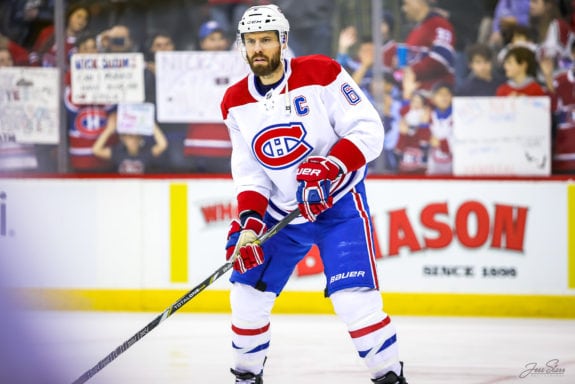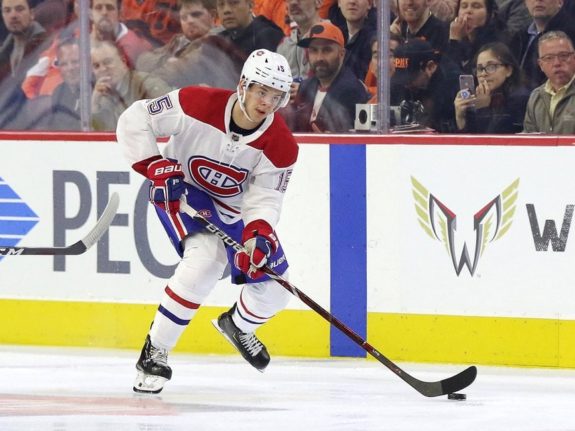Montreal Canadiens captain Shea Weber could miss the entire upcoming season, or even worse, need to retire due to multiple injuries. Nothing has been confirmed yet, but any level of truth could deeply impact the upcoming expansion draft and the Canadiens organization going into next season. Weber has been the Canadiens captain since 2018 and has had multiple injury issues since joining the Canadiens in 2016.
Impact on the Expansion Draft
With Weber potentially going on long-term injury reserve (LTIR), quite a few things will change for the Canadiens regarding the expansion draft. There was a recent debate on social media whether or not the Canadiens will go 7-3-1 to protect players or 8-1. If Weber is going to miss the entire season with a career-threatening injury — which the NHL and NHLPA must confirm, he could be deemed exempt from the draft and will not need to be protected. If Weber does have such an injury, this would allow the Canadiens to go 7-3-1, protecting their top three defencemen in Jeff Petry, Ben Chiarot, and Joel Edmundson.

Weber’s injury will also allow the team to protect seven forwards and essentially not lose anyone of importance at the expansion draft. With the injury concerns, the Canadiens could also leave Weber unprotected — yes, they would risk losing him, but it wouldn’t be very a wise pick by the Seattle Kraken if they decide to take Weber. This news can almost guarantee that the Canadiens will not be using the 8-1 protection method; with no need to protect more than three defensemen, there is no point in only protecting four forwards.
Canadiens Could Spend More in the Offseason
If Weber is going to miss the entire season with his injuries and will be placed on LTIR, then Canadiens general manager (GM) Marc Bergevin will have some more money to spend in the offseason. With Weber on LTIR, his cap hit will remain, but the Canadiens will get relief in the amount of Weber’s cap hit or average annual value (AAV), which is $7.8 million. This extra money could go a long way in helping the Canadiens fill multiple holes in their lineup to improve the team and try to get back to the Stanley Cup Final.
The Canadiens have around $14.6 million in cap space with 15 roster players signed. They still need to sign Jesperi Kotkaniemi and Artturi Lehkonen to contracts — they are both restricted free agents (RFA). The Habs also have key pending free agents (FA) they will consider re-signing: Phil Danault and Corey Perry; these four players will take up a considerable bulk of the $14.6 million. There is also some relief coming with the expansion draft since, whomever the Kraken choose, the Canadians will no longer have that player’s salary against their cap.

Between Weber possibly being put on LTIR and losing a player in the expansion draft, the Canadiens could have as much as $27.9 million or as low as $24.8 million to spend in the offseason, depending on who the Kraken select. This amount of money could go a long way in the Canadiens finding new roster pieces for next season and going after some big-name FAs. However, they must remain aware that $7.8 million must come off the books as soon as Weber is available to return.
What Does This Mean for the Predators
If Weber’s injuries force the Canadiens captain to retire, then his departure from the league will have a significant effect on the Nashville Predators’ cap situation. When Weber was a member of the Predators, he became an RFA in 2012, and the Philadelphia Flyers signed him to an offer sheet. Under the old collective bargaining agreement (CBA) rules, a team could front-load a player’s salary, allowing them to pay most of the contract in the first few years with minimal pay at the end of the contract.
Latest Canadiens Content:
- Canadiens Maybe Relishing Roles of Spoilers to End 2023-24 Too Much?
- Who Will Be the Canadiens’ Starting Goaltender of the Future?
- 5 Canadiens’ Goalies You Didn’t Know Were Habs
- Canadiens Market Pressures Force New Draft Strategies
- NHL Rumors: Flames, Flyers, Canucks, Canadiens
Since the AAV makes up the cap hit, it is greatly reduced by making contracts this way; however, the term is usually long. The Flyers offered a 14-year contract. The Predators matched the offer sheet and were stuck with a 14-year deal worth an AAV of $7.8 million.
The NHL introduced the recapture penalty in the last CBA to discourage these types of contracts. The team signing the player to this type of contract will be on the hook for most of the penalty if that player retires early. So if Weber were to retire due to his injuries this season, then the Predators will have to pay $4.9 million per season until the contract is over; if he plays until 2025-26, the Predators will have to pay $24.5 million total. After the league extended the CBA last season, they changed the recapture rule to allow teams to pay out large sums over a period of time, and this will help the Predators if Weber retires in 2025-26, but it’d still be a hit on their cap.
Weber’s Future
There is a lot of uncertainty about what actually is wrong with Weber or what will happen to him in the long run. Weber is a true leader for the Canadiens and a well-respected captain in the NHL. He reached the Stanley Cup Final for the first time in his career, and maybe the last; with the injuries mounting up, Weber might have even seen his last NHL game. During the playoff run, Weber played with a thumb injury and a knee and an ankle injury; he played like a warrior and actually improved his game in the playoffs, even though the injuries kept mounting.
What does the future hold for Weber and the Canadiens? Well, if it’s just going to be for the season, then nothing needs to be done. The Habs can go out and get someone to replace Weber and then restructure the roster to fit Weber’s contract in when he returns. If he needs to retire, then there are several options. The one that makes the most sense would be to trade him back to the Predators so they can be relieved of the recapture penalty by placing Weber on LTIR. This way, the Canadiens can get an asset back and not essentially lose Weber for nothing. The final option is Weber just retires. The Predators pay the penalty until his contract is over, and the Canadiens use the newfound cap space to sign another top-four defenseman.
No one wants Weber to retire, and hopefully, things are not as serious as first reported, but we all have to prepare for the worst. In the end, the only thing that will hurt the Canadiens is the loss of his leadership in the room and the warrior-type player that Weber is on the ice.